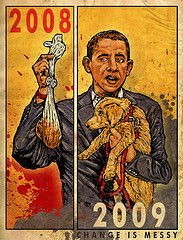Do you realize this will cost up to $2 Trillion dollars? For a program that has failed miserably every it has been tried? It's socialism and it will fail and it will cost generations.
Still sound good?
Indeed, The Wall Street Journal reports:
Mr. Orszag champions "comparative effectiveness research" -- studying the patterns of clinical practice to determine which drugs and treatments work best. The Administration thinks it can use such analysis to weed out wasteful or unnecessary care by paying more "if the treatment has been shown to be effective and a little less if not," as Mr. Orszag recently told the New Yorker.
The irony is that the history of post-1965 U.S. health care policy is littered with similar government attempts to control health spending, not least comparative effectiveness. The "managed care" movement of the 1990s grew directly out of the peer-review panels created by Congress in 1972 to monitor the quality and appropriateness of care for Medicare and Medicaid patients.
Under managed care, doctors and hospitals had to undergo prior "utilization review" by HMOs to reduce unnecessary hospitalizations, surgeries, tests, prescriptions and so on. This cost-effectiveness gatekeeping disciplined health spending. What happened next to this version of the dream is known to all.
Administrative hassles led to a consumer backlash, with patients feeling they were getting inferior care in return for insurer profits. The political class eventually forced the HMOs to dilute or end most of their cost-control strategies.
Democrats have now acknowledged that the managed care dream will work only if government is the one doing the managing. That is, we can only control costs with a new government entitlement. More is less.
But you can only allocate a scarce resource in two ways: market prices or brute force. In health care the brute force will come as price controls and waiting lines for rationed services. The implicit assumption in the providers' deal announced yesterday seems to be that the private companies will do the price controlling so the government won't have to do it for them.
But when the savings prove illusory, as in the past, the feds will step in and order them to do so. To win a false reprieve for themselves and give cost cover to the politicians, these private CEOs are offering to make themselves even more unpopular with patients. By that point, most patients will have no choice but to assent, since most of them will be in one government program or another.
Lest anyone remains in doubt about the ultimate goal here, Ralph Neas of the leftist National Coalition on Health Care got out a quick statement throwing ice water on the industry's concession. With perfect clarity Mr. Neas said: "Voluntary efforts -- without legislated requirements and enforcement -- have not worked well in the past."
The only benefit here is that it is now possible to see where this issue is headed: A new legislated entitlement for the middle class will ensure that the next great health-care argument to engulf the political system is going to be over how and when to ration care.






No comments:
Post a Comment